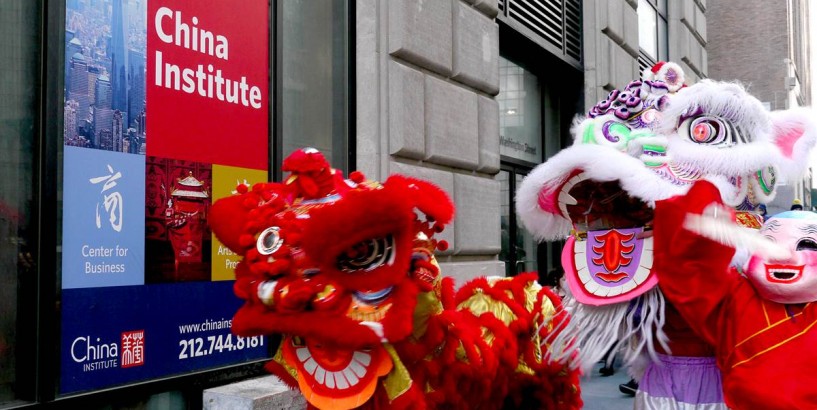The soft power of New York's China Institute The group is aiming to build bridges — as it has through a communist revolution, the Cold War, the Cultural Revolution, Tiananmen Square and more. The China Institute in New York City. Courtesy The China Institute Breaking News Emails April 2, 2020, 8:27 PM UTC ByChris Fuchs In its nearly 100 years of existence, the China Institute has sought to deepen Americans' understanding of China — including a communist revolution, the founding of the People’s Republic of China, Nixon's opening to China, Tiananmen Square, a trade war and much, much more. But heightened anxiety around U.S.-China relations because of the coronavirus pandemic poses a different challenge for a bicultural nonprofit founded in Manhattan in 1926. “China Institute stands firm in feeling that we need to connect the people of China and the people of the U.S.,” James B. Heimowitz, the institute’s president, told NBC News. “Because no matter what you think about the politics of these countries, they are, in my view, unquestionably going to be the two most important countries to occupy our planet for the next chunk of time.” As U.S. and Chinese leaders trade barbs over who’s to blame for the outbreak — and as reports of racist and xenophobic acts related to the coronavirus surge in America — Heimowitz said China Institute’s work has taken on an added level of importance. He said he sees the organization, which is apolitical, as giving people “the building blocks that enable them to build their own bridges” through programs in education, culture, the arts and business. Over the years, Heimowitz estimates that nearly 1 million individuals have walked through its doors, from businessmen attending the institute’s economic summits to people participating in its food festivals. Like other organizations, the China Institute has moved everything online because of the pandemic. That includes all of its classes, as well as virtual tours of its galleries. The Morning Rundown Get a head start on the morning's top stories. Sign Up This site is protected by recaptcha Privacy Policy | Terms of Service Shenzhan Liao, head of the institute’s School of Chinese Studies, has been leading that charge for the 120 children and 200 adults enrolled in classes. Similar to students in other schools, they are also adjusting to the new norm of receiving instruction via Zoom, the video-sharing platform. But along with video-streaming comes the potential for harassment . In late March, the school offered free half-hour trials of Chinese-language courses for adults on Zoom, Liao said. During a meeting with teachers last week, Liao said she learned there might have been an incident in which inappropriate comments were made. “Whenever you go online, especially a publicly accessible platform, it could happen,” she said. “So it is for us to set up the protocol in terms of how to be mutually respectful.” In addition to its classes, the China Institute will hold a series in April called Beyond COVID-19. For example, a virtual program on April 7 at 1 p.m. ET titled "Has China Won?" will focus on the virus and the shifting global order. Other virtual programs will address the response of Chinese restaurants in the U.S. to the health crisis and U.S.-China efforts to boost the world economy. “Now’s the time more than ever for us to be really timely,” Heimowitz said. He added that the institute’s members, many of them millennials, have reached out for ways to talk with one another and to find solutions rather than point fingers. “They’ve said to me things like, 'I feel like the governments of these two important countries are behaving like children and that they’re throwing accusations back and forth,'” Heimowitz said. Liao said that while tougher times may lie ahead, the China Institute’s School of Chinese Studies is hopeful that its shift to virtual learning could open new windows for teaching Chinese language and culture to Americans. “There’s actually, in fact, a certain excitement while we are conducting and creating online materials to share with parents and the general public,” she said. Donors, meanwhile, are stepping up to help with to help with the institute's operating funds, which Heimowitz said come from such sources as individuals, foundations, tuition revenue, and capital campaigns. The institute reported total assets of $38 million last year, and since going virtual, it has received checks from three new corporate members, according to Heimowitz. “I think that our membership is keenly aware of how important it is not to disengage with China,” he said. But the push to keep open the channels of exchange between people from the world’s two economic superpowers could pose a significant challenge in the months and years to come, especially with the inflamed rhetoric coming from both sides. “We’re not going to agree on everything,” Heimowitz said. “We have very different systems, in many ways different values. But we also have to find a way to collaborate on issues that are important for humanity, on issues that are important for the globe." Chris Fuchs Chris Fuchs is a freelance journalist based in New York. His articles have appeared in Foreign Policy and the Taipei Times and in Chinese on ETToday.net , a popular Taiwanese news website.
© 2024, Copyrights gulftimes.com. All Rights Reserved









